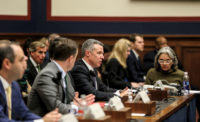Two senior U.S. senators who oversee highway policy issues have added their voices to an effort to undo a $7.6-billion rescission in highway funds that will take effect in July 2020 unless Congress blocks the cutback.
The two lawmakers, Environment and Public Works Committee Chairman John Barrasso (R-Wyo.) and the committee’s top Democrat, Tom Carper (Del.), say they want legislators and White House officials who have been negotiating a possible deal on overall fiscal 2020 federal spending caps to include a provision to cancel the highway rescission.
The rescission of highway contract authority was part of the last big highway-transit authorization measure, 2015’s Fixing America’s Surface Transportation, or FAST, Act. The $7.6-billion cut was viewed as a move by the FAST Act’s drafters to reduce that legislation’s overall price tag.
Barrasso and Carper, the prime architects of the Senate version of the next highway reauthorization, are looking for speedy action on repealing the rescission.
They said in a June 12 letter to Senate Majority Leader Mitch McConnell (R-Ky.) and the chamber’s Minority Leader, Chuck Schumer (D- N.Y.), “It is critical that this rescission be repealed in any future budget or spending agreement that the Congress considers before the end of this fiscal year.”
Barrasso and Carper said, “If it stands, this rescission will impact every state’s ability to plan, build and repair needed roads and bridges that are vital to American communities.”
Sarah Durdaller, press secretary for Senate EPW Committee Republicans, said via email on June 20 that McConnell and Schumer “have received the letter and are aware of the importance of this issue.”
The two senators also said that they are making progress on a successor to the FAST Act’s highway title and plan to move it through their committee this summer.
According to the Federal Highway Administration, the rescission would apply to states’ unobligated balances of highway contract authority as of Sept. 30 of this year. (Some types of highway funds would be exempt.)
States’ shares of the $7.6-billion total will be based on their percentages of the overall unobligated balances as of the end of September.
FHWA will issue a formal notice this October listing preliminary figures for each state’s rescinded amount.
Funds will be actually withdrawn on July 1, 2020, unless Congress cancels the slated cutback.
The American Association of State Highway and Transportation Officials is focused on the rescission issue, says Susan Howard, program director for transportation finance. Howard said in an interview that AASHTO wants to have the planned cutback addressed in the budget agreement, because rescission "will hit before the FAST Act expires.”
She adds, “And so it really needs to be dealt with as soon as possible and in the most ‘friendly’ vehicle, which we think the budget deal…would be.”
Howard says that if $7.6-billion rescission remains in place, it poses a major problem because “every state will be impacted in varying degrees.” States generally have some flexibility to shift contract authority among category types.
The Barrasso-Carper letter follows a similar one that House Transportation and Infrastructure Committee Chairman Peter DeFazio (D-Ore.), committee ranking Republican Sam Graves (Mo.), and other leaders of that panel sent to House leaders on May 8.
Construction and transportation organizations also are pushing to see the rescission removed. AASHTO and 30 other groups sent a letter on May 20 letter to congressional leaders, stating, “If the FAST Act rescission of $7.6 billion is allowed to execute, it will virtually wipe out all remaining contract authority available to states nationwide in the programs subject to the rescission.”
They added, “The rescission will result in real cuts to transportation funding and cause delays in project construction at a time that both Congress and the administration are looking to increase transportation investments.”



Post a comment to this article
Report Abusive Comment